Adding Matt operator to Roslyn - Binder
Following on my previous post where I showed how to add a new operator to C# and Roslyn today I’m going to describe how to make further progress on implementing matt operator: m@. I already extender the Lexer and Parser to understand that new language construct. The next step is to make Binder aware of our new operator, to make sure it can only be used in the right places and with the right types. We also need to teach the compiler that <int> m@ <int> returns an int.
Iterative & exploratory approach
Similarly to what I did when implementing lexing and parsing support, I decided to go with an exploratory approach:
- Try to use the new operator
- See where it fails
- Fix the problem
- Go back to 1. untill everything is working as expected
Yesterday I used a Unit Test as validation mechanism. Today I’m actually launching Visual Studio with my custom compiler behind it and try to parse a C# file which uses m@. The C# input is super simple:
using System;
public class Class1
{
public Class1()
{
var t = 1 m@ 2;
}
}
With that Visual Studio fails with an exception:
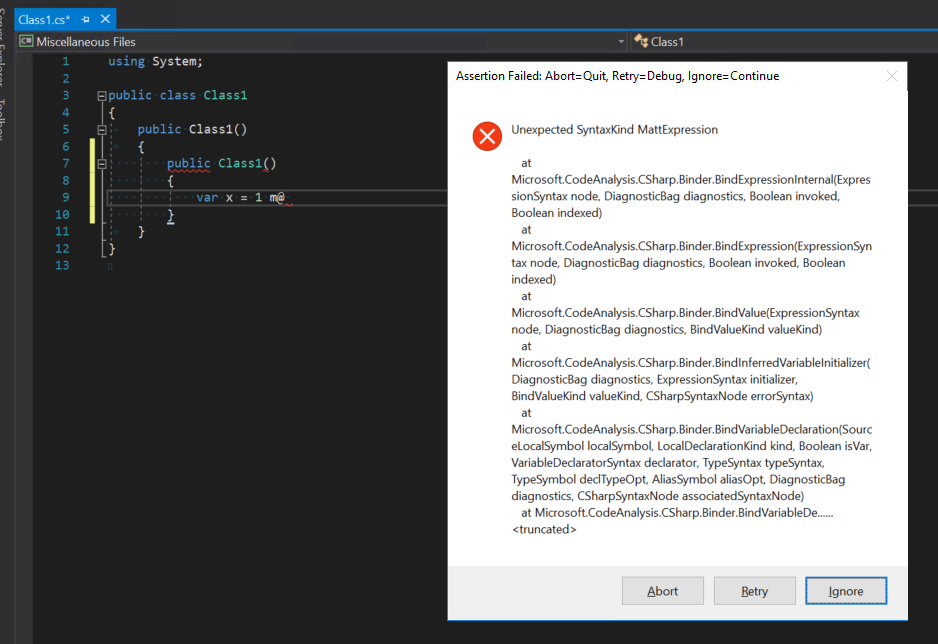
And after fixing this one, another similar one came, and so on. I won’t show all of them, but instead focus on the changes necessary to make them go away.
BinaryOperatorKind and necessary mapping
First of all, it’s necessary to define our new operator in \roslyn\src\compilers\csharp\portable\binder\semantics\operators\operatorkind.cs enum. m@ is a binary operator, so it has to be added to BinaryOperatorKind. That enum not only defines all the operators, but also contains a definition of what type can be used with that operator. e.g. here is part of Addition-related entries:
Addition = 0x00001100,
/// (...)
IntAddition = Int | Addition,
UIntAddition = UInt | Addition,
LongAddition = Long | Addition,
ULongAddition = ULong | Addition,
// (...) +25 similar entries
StringAndObjectConcatenation = StringAndObject | Addition,
ObjectAndStringConcatenation = ObjectAndString | Addition,
DelegateCombination = Delegate | Addition,
DynamicAddition = Dynamic | Addition,
To make it easier let’s define just Matt and IntMatt.
Matt = 0x00002000,
IntMatt = Int | Matt,
With that we can define SyntaxKind.MattExpression -> BinaryOperatorKind.Matt mapping in \roslyn\src\Compilers\CSharp\Portable\Binder\Binder_Operators.cs:
private static BinaryOperatorKind SyntaxKindToBinaryOperatorKind(SyntaxKind kind)
{
switch (kind)
{
case SyntaxKind.MultiplyAssignmentExpression:
case SyntaxKind.MultiplyExpression: return BinaryOperatorKind.Multiplication;
// (...)
case SyntaxKind.MattExpression: return BinaryOperatorKind.Matt;
default: throw ExceptionUtilities.UnexpectedValue(kind);
}
}
We also have to modify IsSimpleBinaryOperator
protected static bool IsSimpleBinaryOperator(SyntaxKind kind)
{
// We deliberately exclude &&, ||, ??, etc.
switch (kind)
{
case SyntaxKind.AddExpression:
// (...)
case SyntaxKind.RightShiftExpression:
case SyntaxKind.MattExpression:
return true;
}
return false;
}
and BindExpressionInternal in \roslyn\src\Compilers\CSharp\Portable\Binder\Binder_Expressions.cs
case SyntaxKind.RightShiftExpression:
case SyntaxKind.MattExpression:
return BindSimpleBinaryOperator((BinaryExpressionSyntax)node, diagnostics);
Overload Resolution
In this next step we have to define how Binder should decide what type overload should an expression be resolved to. All that is done in \roslyn\src\Compilers\CSharp\Portable\Binder\Semantics\Operators\BinaryOperatorEasyOut.cs in a form of big jagged arrays. Here’s a snippet from s_arithmetic:
// Overload resolution for Y * / - % < > <= >= X
private static readonly BinaryOperatorKind[,] s_arithmetic =
{
// ----------------regular------------------- ----------------nullable-------------------
// obj str bool chr i08 i16 i32 i64 u08 u16 u32 u64 r32 r64 dec bool chr i08 i16 i32 i64 u08 u16 u32 u64 r32 r64 dec
/* obj */
{ ERR, ERR, ERR, ERR, ERR, ERR, ERR, ERR, ERR, ERR, ERR, ERR, ERR, ERR, ERR, ERR, ERR, ERR, ERR, ERR, ERR, ERR, ERR, ERR, ERR, ERR, ERR, ERR },
/* str */
{ ERR, ERR, ERR, ERR, ERR, ERR, ERR, ERR, ERR, ERR, ERR, ERR, ERR, ERR, ERR, ERR, ERR, ERR, ERR, ERR, ERR, ERR, ERR, ERR, ERR, ERR, ERR, ERR },
/* bool */
{ ERR, ERR, ERR, ERR, ERR, ERR, ERR, ERR, ERR, ERR, ERR, ERR, ERR, ERR, ERR, ERR, ERR, ERR, ERR, ERR, ERR, ERR, ERR, ERR, ERR, ERR, ERR, ERR },
/* chr */
{ ERR, ERR, ERR, INT, INT, INT, INT, LNG, INT, INT, UIN, ULG, FLT, DBL, DEC, ERR, LIN, LIN, LIN, LIN, LLG, LIN, LIN, LUN, LUL, LFL, LDB, LDC },
/* i08 */
{ ERR, ERR, ERR, INT, INT, INT, INT, LNG, INT, INT, LNG, ERR, FLT, DBL, DEC, ERR, LIN, LIN, LIN, LIN, LLG, LIN, LIN, LLG, ERR, LFL, LDB, LDC },
/* i16 */
{ ERR, ERR, ERR, INT, INT, INT, INT, LNG, INT, INT, LNG, ERR, FLT, DBL, DEC, ERR, LIN, LIN, LIN, LIN, LLG, LIN, LIN, LLG, ERR, LFL, LDB, LDC },
/* i32 */
{ ERR, ERR, ERR, INT, INT, INT, INT, LNG, INT, INT, LNG, ERR, FLT, DBL, DEC, ERR, LIN, LIN, LIN, LIN, LLG, LIN, LIN, LLG, ERR, LFL, LDB, LDC },
/* i64 */
{ ERR, ERR, ERR, LNG, LNG, LNG, LNG, LNG, LNG, LNG, LNG, ERR, FLT, DBL, DEC, ERR, LLG, LLG, LLG, LLG, LLG, LLG, LLG, LLG, ERR, LFL, LDB, LDC },
// (...) and many more of rows similar to the ones above
It’s a resolution table, which is later used to see if an operator (in this particular case *, /, -, %, <, >, <=, >=) is allowed to be used with left and right arguments of a given type, and what is the return type of that expression for these input types. For our implementation of m@ it should always return ERR (which means such usage is not allowed), except for i32-i32 case where we should return INT (alias for BinaryOperatorKind.Int):
// Overload resolution for Y m@ X
private static readonly BinaryOperatorKind[,] s_matt =
{
// ----------------regular------------------- ----------------nullable-------------------
// obj str bool chr i08 i16 i32 i64 u08 u16 u32 u64 r32 r64 dec bool chr i08 i16 i32 i64 u08 u16 u32 u64 r32 r64 dec
/* obj */
{ ERR, ERR, ERR, ERR, ERR, ERR, ERR, ERR, ERR, ERR, ERR, ERR, ERR, ERR, ERR, ERR, ERR, ERR, ERR, ERR, ERR, ERR, ERR, ERR, ERR, ERR, ERR, ERR },
/* str */
{ ERR, ERR, ERR, ERR, ERR, ERR, ERR, ERR, ERR, ERR, ERR, ERR, ERR, ERR, ERR, ERR, ERR, ERR, ERR, ERR, ERR, ERR, ERR, ERR, ERR, ERR, ERR, ERR },
/* bool */
{ ERR, ERR, ERR, ERR, ERR, ERR, ERR, ERR, ERR, ERR, ERR, ERR, ERR, ERR, ERR, ERR, ERR, ERR, ERR, ERR, ERR, ERR, ERR, ERR, ERR, ERR, ERR, ERR },
/* chr */
{ ERR, ERR, ERR, ERR, ERR, ERR, ERR, ERR, ERR, ERR, ERR, ERR, ERR, ERR, ERR, ERR, ERR, ERR, ERR, ERR, ERR, ERR, ERR, ERR, ERR, ERR, ERR, ERR },
/* i08 */
{ ERR, ERR, ERR, ERR, ERR, ERR, ERR, ERR, ERR, ERR, ERR, ERR, ERR, ERR, ERR, ERR, ERR, ERR, ERR, ERR, ERR, ERR, ERR, ERR, ERR, ERR, ERR, ERR },
/* i16 */
{ ERR, ERR, ERR, ERR, ERR, ERR, ERR, ERR, ERR, ERR, ERR, ERR, ERR, ERR, ERR, ERR, ERR, ERR, ERR, ERR, ERR, ERR, ERR, ERR, ERR, ERR, ERR, ERR },
/* i32 */
{ ERR, ERR, ERR, ERR, ERR, ERR, INT, ERR, ERR, ERR, ERR, ERR, ERR, ERR, ERR, ERR, ERR, ERR, ERR, ERR, ERR, ERR, ERR, ERR, ERR, ERR, ERR, ERR },
/* i64 */
{ ERR, ERR, ERR, ERR, ERR, ERR, ERR, ERR, ERR, ERR, ERR, ERR, ERR, ERR, ERR, ERR, ERR, ERR, ERR, ERR, ERR, ERR, ERR, ERR, ERR, ERR, ERR, ERR },
/* u08 */
{ ERR, ERR, ERR, ERR, ERR, ERR, ERR, ERR, ERR, ERR, ERR, ERR, ERR, ERR, ERR, ERR, ERR, ERR, ERR, ERR, ERR, ERR, ERR, ERR, ERR, ERR, ERR, ERR },
/* u16 */
{ ERR, ERR, ERR, ERR, ERR, ERR, ERR, ERR, ERR, ERR, ERR, ERR, ERR, ERR, ERR, ERR, ERR, ERR, ERR, ERR, ERR, ERR, ERR, ERR, ERR, ERR, ERR, ERR },
/* u32 */
{ ERR, ERR, ERR, ERR, ERR, ERR, ERR, ERR, ERR, ERR, ERR, ERR, ERR, ERR, ERR, ERR, ERR, ERR, ERR, ERR, ERR, ERR, ERR, ERR, ERR, ERR, ERR, ERR },
/* u64 */
{ ERR, ERR, ERR, ERR, ERR, ERR, ERR, ERR, ERR, ERR, ERR, ERR, ERR, ERR, ERR, ERR, ERR, ERR, ERR, ERR, ERR, ERR, ERR, ERR, ERR, ERR, ERR, ERR },
/* r32 */
{ ERR, ERR, ERR, ERR, ERR, ERR, ERR, ERR, ERR, ERR, ERR, ERR, ERR, ERR, ERR, ERR, ERR, ERR, ERR, ERR, ERR, ERR, ERR, ERR, ERR, ERR, ERR, ERR },
/* r64 */
{ ERR, ERR, ERR, ERR, ERR, ERR, ERR, ERR, ERR, ERR, ERR, ERR, ERR, ERR, ERR, ERR, ERR, ERR, ERR, ERR, ERR, ERR, ERR, ERR, ERR, ERR, ERR, ERR },
/* dec */
{ ERR, ERR, ERR, ERR, ERR, ERR, ERR, ERR, ERR, ERR, ERR, ERR, ERR, ERR, ERR, ERR, ERR, ERR, ERR, ERR, ERR, ERR, ERR, ERR, ERR, ERR, ERR, ERR },
/*nbool */
{ ERR, ERR, ERR, ERR, ERR, ERR, ERR, ERR, ERR, ERR, ERR, ERR, ERR, ERR, ERR, ERR, ERR, ERR, ERR, ERR, ERR, ERR, ERR, ERR, ERR, ERR, ERR, ERR },
/* nchr */
{ ERR, ERR, ERR, ERR, ERR, ERR, ERR, ERR, ERR, ERR, ERR, ERR, ERR, ERR, ERR, ERR, ERR, ERR, ERR, ERR, ERR, ERR, ERR, ERR, ERR, ERR, ERR, ERR },
/* ni08 */
{ ERR, ERR, ERR, ERR, ERR, ERR, ERR, ERR, ERR, ERR, ERR, ERR, ERR, ERR, ERR, ERR, ERR, ERR, ERR, ERR, ERR, ERR, ERR, ERR, ERR, ERR, ERR, ERR },
/* ni16 */
{ ERR, ERR, ERR, ERR, ERR, ERR, ERR, ERR, ERR, ERR, ERR, ERR, ERR, ERR, ERR, ERR, ERR, ERR, ERR, ERR, ERR, ERR, ERR, ERR, ERR, ERR, ERR, ERR },
/* ni32 */
{ ERR, ERR, ERR, ERR, ERR, ERR, ERR, ERR, ERR, ERR, ERR, ERR, ERR, ERR, ERR, ERR, ERR, ERR, ERR, ERR, ERR, ERR, ERR, ERR, ERR, ERR, ERR, ERR },
/* ni64 */
{ ERR, ERR, ERR, ERR, ERR, ERR, ERR, ERR, ERR, ERR, ERR, ERR, ERR, ERR, ERR, ERR, ERR, ERR, ERR, ERR, ERR, ERR, ERR, ERR, ERR, ERR, ERR, ERR },
/* nu08 */
{ ERR, ERR, ERR, ERR, ERR, ERR, ERR, ERR, ERR, ERR, ERR, ERR, ERR, ERR, ERR, ERR, ERR, ERR, ERR, ERR, ERR, ERR, ERR, ERR, ERR, ERR, ERR, ERR },
/* nu16 */
{ ERR, ERR, ERR, ERR, ERR, ERR, ERR, ERR, ERR, ERR, ERR, ERR, ERR, ERR, ERR, ERR, ERR, ERR, ERR, ERR, ERR, ERR, ERR, ERR, ERR, ERR, ERR, ERR },
/* nu32 */
{ ERR, ERR, ERR, ERR, ERR, ERR, ERR, ERR, ERR, ERR, ERR, ERR, ERR, ERR, ERR, ERR, ERR, ERR, ERR, ERR, ERR, ERR, ERR, ERR, ERR, ERR, ERR, ERR },
/* nu64 */
{ ERR, ERR, ERR, ERR, ERR, ERR, ERR, ERR, ERR, ERR, ERR, ERR, ERR, ERR, ERR, ERR, ERR, ERR, ERR, ERR, ERR, ERR, ERR, ERR, ERR, ERR, ERR, ERR },
/* nr32 */
{ ERR, ERR, ERR, ERR, ERR, ERR, ERR, ERR, ERR, ERR, ERR, ERR, ERR, ERR, ERR, ERR, ERR, ERR, ERR, ERR, ERR, ERR, ERR, ERR, ERR, ERR, ERR, ERR },
/* nr64 */
{ ERR, ERR, ERR, ERR, ERR, ERR, ERR, ERR, ERR, ERR, ERR, ERR, ERR, ERR, ERR, ERR, ERR, ERR, ERR, ERR, ERR, ERR, ERR, ERR, ERR, ERR, ERR, ERR },
/* ndec */
{ ERR, ERR, ERR, ERR, ERR, ERR, ERR, ERR, ERR, ERR, ERR, ERR, ERR, ERR, ERR, ERR, ERR, ERR, ERR, ERR, ERR, ERR, ERR, ERR, ERR, ERR, ERR, ERR },
};
Did you notice that single INT in the entire table above? If you missed, check again ;)
It’s also required to add s_matt to s_opkind. It has to be the last entry, because we defined BinaryOperatorKind.Matt after all the other operators.
private static readonly BinaryOperatorKind[][,] s_opkind =
{
/* * */ s_arithmetic,
/* + */ s_addition,
/* - */ s_arithmetic,
/* / */ s_arithmetic,
/* % */ s_arithmetic,
/* >> */ s_shift,
/* << */ s_shift,
/* == */ s_equality,
/* != */ s_equality,
/* > */ s_arithmetic,
/* < */ s_arithmetic,
/* >= */ s_arithmetic,
/* <= */ s_arithmetic,
/* & */ s_logical,
/* | */ s_logical,
/* ^ */ s_logical,
/* m@ */ s_matt,
};
With all these changes Visual Studio is a bit happier when loading a C# file where m@ is being used. It is able to correctly identify the return value of 1 m@ 2 as int:
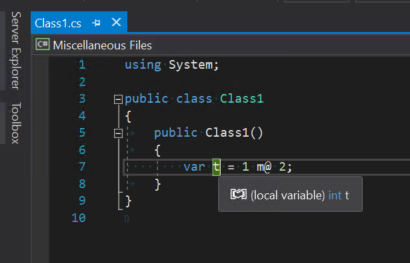
However, as soon as we hover over the operator itself, things stop looking that good.

Operator Name
We missed to teach the compiler about m@ in couple places.
First of all, we need to add MattOperatorName in \roslyn\src\Compilers\Core\Portable\Symbols\WellKnownMemberNames.cs:
/// <summary>
/// The name assigned to the Matt operator.
/// </summary>
public const string MattOperatorName = "op_Matt";
Based on a suggestion from a Code Fix it also has to be added to \roslyn\src\Compilers\Core\Portable\PublicAPI.Unshipped.txt:
// (...)
abstract Microsoft.CodeAnalysis.SemanticModel.GetOperationCore(Microsoft.CodeAnalysis.SyntaxNode node, System.Threading.CancellationToken cancellationToken) -> Microsoft.CodeAnalysis.IOperation
const Microsoft.CodeAnalysis.WellKnownMemberNames.MattOperatorName = "op_Matt" -> string
// (...)
After that’s defined we can add it to BinaryOperatorNameFromOperatorKind and BinaryOperatorNameFromSyntaxKindIfAny:
internal static string BinaryOperatorNameFromSyntaxKindIfAny(SyntaxKind kind)
{
switch (kind)
{
case SyntaxKind.PlusToken: return WellKnownMemberNames.AdditionOperatorName;
// (...)
case SyntaxKind.ExclamationEqualsToken: return WellKnownMemberNames.InequalityOperatorName;
case SyntaxKind.MattToken: return WellKnownMemberNames.MattOperatorName;
default:
return null;
}
}
public static string BinaryOperatorNameFromOperatorKind(BinaryOperatorKind kind)
{
switch (kind & BinaryOperatorKind.OpMask)
{
case BinaryOperatorKind.Addition: return WellKnownMemberNames.AdditionOperatorName;
// (...)
case BinaryOperatorKind.Xor: return WellKnownMemberNames.ExclusiveOrOperatorName;
case BinaryOperatorKind.Matt: return WellKnownMemberNames.MattOperatorName;
default:
throw ExceptionUtilities.UnexpectedValue(kind & BinaryOperatorKind.OpMask);
}
}
A similar mapping has to be defined in GetOperatorKind to make the tooltip show correct value:
public static SyntaxKind GetOperatorKind(string operatorMetadataName)
{
switch (operatorMetadataName)
{
case WellKnownMemberNames.AdditionOperatorName: return SyntaxKind.PlusToken;
// (...)
case WellKnownMemberNames.UnaryPlusOperatorName: return SyntaxKind.PlusToken;
case WellKnownMemberNames.MattOperatorName: return SyntaxKind.MattToken;
default:
return SyntaxKind.None;
}
}
With these changes, Visual Studio shows the right tooltip!
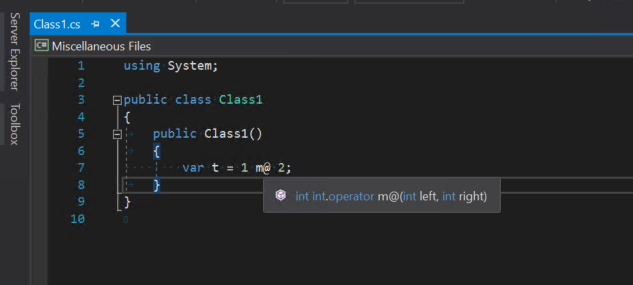
Trying to use m@ with non-int arguments
Everything seemed to be working fine, until I decided to try to use m@ with non-int value:
var x = 1 m@ 2d;
A set of exceptions guided me towards couple more place where we have to make the compiler aware of Matt operator.

BuiltInOperators.GetSimpleBuiltInOperators:
var logicalOperators = new ImmutableArray<BinaryOperatorSignature>[]
{
ImmutableArray<BinaryOperatorSignature>.Empty, //multiplication
// (...)
ImmutableArray.Create<BinaryOperatorSignature>(GetSignature(BinaryOperatorKind.LogicalBoolOr)), //or
ImmutableArray<BinaryOperatorSignature>.Empty, //matt
};
var nonLogicalOperators = new ImmutableArray<BinaryOperatorSignature>[]
{
// (...)
GetSignaturesFromBinaryOperatorKinds(new []
{
(int)BinaryOperatorKind.IntMatt,
}),
};
GetDelegateOperations and GetEnumOperations in \roslyn\src\Compilers\CSharp\Portable\Binder\Semantics\Operators\BinaryOperatorOverloadResolution.cs:
private void GetDelegateOperations(BinaryOperatorKind kind, BoundExpression left, BoundExpression right,
ArrayBuilder<BinaryOperatorSignature> operators, ref HashSet<DiagnosticInfo> useSiteDiagnostics)
{
Debug.Assert(left != null);
Debug.Assert(right != null);
AssertNotChecked(kind);
switch (kind)
{
case BinaryOperatorKind.Multiplication:
// (...)
case BinaryOperatorKind.LogicalOr:
case BinaryOperatorKind.Matt:
return;
case BinaryOperatorKind.Addition:
case BinaryOperatorKind.Subtraction:
case BinaryOperatorKind.Equal:
case BinaryOperatorKind.NotEqual:
break;
I’m not realy sure what the difference is. Seems like there are some special cases for +, - and equality which I don’t want to worry about for now.
private void GetEnumOperations(BinaryOperatorKind kind, BoundExpression left, BoundExpression right, ArrayBuilder<BinaryOperatorSignature> results)
{
Debug.Assert(left != null);
Debug.Assert(right != null);
AssertNotChecked(kind);
// First take some easy outs:
switch (kind)
{
case BinaryOperatorKind.Multiplication:
case BinaryOperatorKind.Division:
case BinaryOperatorKind.Remainder:
case BinaryOperatorKind.RightShift:
case BinaryOperatorKind.LeftShift:
case BinaryOperatorKind.LogicalAnd:
case BinaryOperatorKind.LogicalOr:
case BinaryOperatorKind.Matt:
return;
}
It works!
Looks like these are all the changes needed to make Visual Studio somehow happy. It’s able to correctly parse the code, figure out that m@ can only be used with ints, (the return type can’t be resolved out if used with non-int input) + the right help tooltip is shown when hovered over the new operator. Not bad!
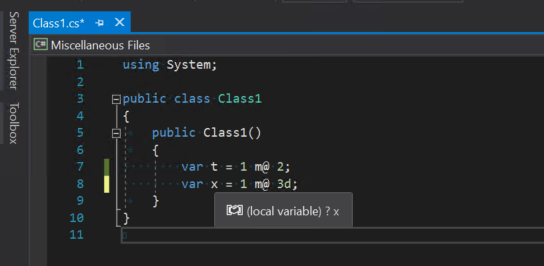
Things go south when you try to actually compile the code as part of a project. csc.exe exits with an error code, which is handled by Visual Studio and an exception is thrown.
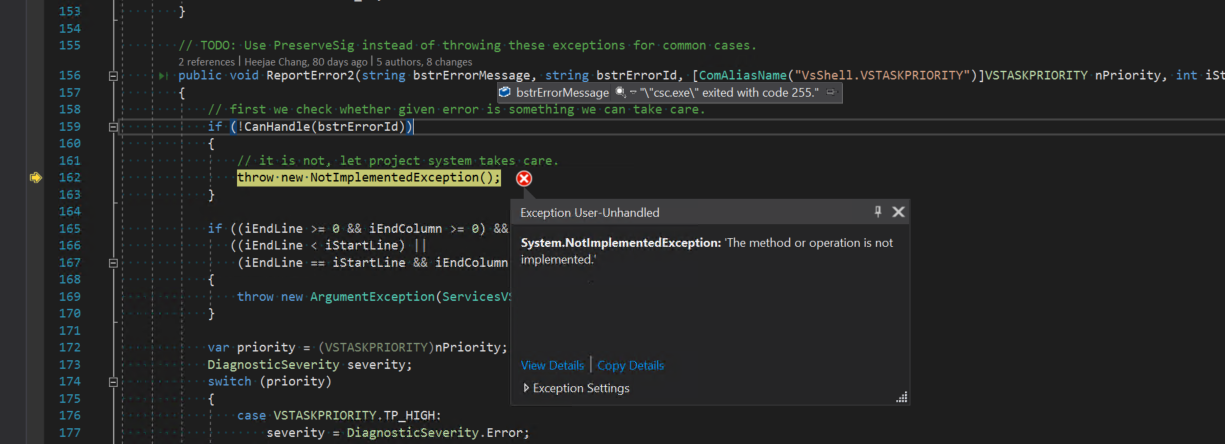
That’s totally expected though. We haven’t yet touched the last part of Roslyn pipeline - the Emmiter. That’s where IL is generated. But that’s a topic for next post!
PS. All the code changes described in this post can be viewed on GitHub: MarcinJuraszek/roslyn/commit/6d9b2aad5ec78d314749b088697c5a28fe9f6b15.
PS.2. When looking through the code I noticed that if we wanted to make Matt overridable we’d also have to modify PEMethodSymbol.ComputeMethodKind. For us, the default value works just fine, so I decided not to touch it. But just saying, in case somebody wants to push it further and allow for custom operators to be defined.
PS.3. The third part of the series is now out: Adding Matt operator to Roslyn - Emitter.